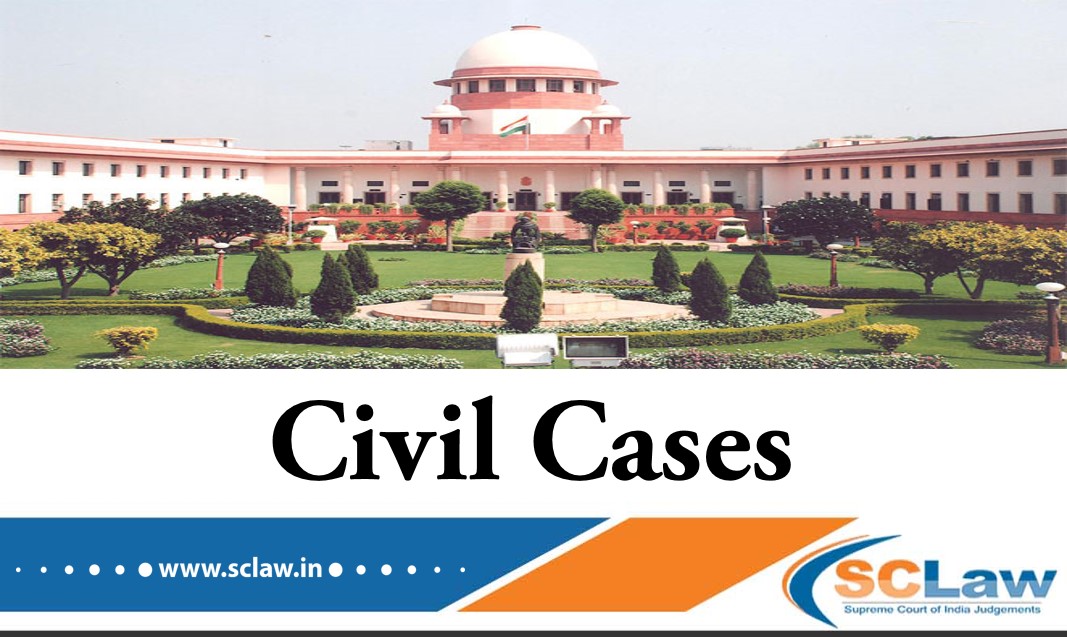Appeal–Dismissal of an appeal for default or non-prosecution without going into the merits of the case is clearly illegal and the Appellate Court must dispose of the appeal on merits after perusal and scrutiny of record and after giving a hearing to the parties, if present, before disposal of the appeal on merits
2008(1) LAW HERALD (SC) 225 IN THE SUPREME COURT OF INDIA Before The Hon’ble Mr. Justice C.K. Thakker The Hon’ble Mr. Justice Tarun Chatterjee Criminal Appeal No. 884 of 2001…
Voluntary Retirement–Relaxation in Eligibility–It is for the Authorities to consider the eligibility for pension and decide the representation of the employee concerned–Ordered accordingly.
2008(1) LAW HERALD (SC) 223 IN THE SUPREME COURT OF INDIA Before The Hon’ble Mr. Justice Dr. Arijit Pasayat The Hon’ble Mr. Justice P. Sathasivam Appeal (civil) 928 of 2002…
Held; if the allegations are found to be substantiated it would affect the image of Commission–But that cannot be a ground to stall investigation which has to be done in a transparent manner
2008(1) LAW HERALD (SC) 220 IN THE SUPREME COURT OF INDIA Before The Hon’ble Mr. Justice Arijit Pasayat The Hon’ble Mr. Justice Lokeshwar Singh Panta Civil Appeal No. 5954 of…
Execution of Decree—Suit for possession—Application for demarcation of land is not maintainable before executing court.
2017(3) Law Herald (P&H) 2073 (SC) : 2017 Law Herald.Org 1147 IN THE SUPREME COURT OF INDIA Before Hon’bie Mr. Justice Arun Mishra Hon’ble Mr. Justice S. Abdul Nazeer Civil…
Transfer of Property—Part Performance—Mere expiry of the period of limitation for a suit for specific performance may not be a bar for a person in possession of an immovable property in part performance of a contract to assert the shield of Section 53A of T.P. Act
2017(3) Law Herald (P&H) 2065 (SC) : 2017 LawHerald.Org 1133 IN THE SUPREME COURT OF INDIA Before The Hon’ble Mr. Justice Dipak Misra The Hon’ble Mr. Justice…
Copyright–The judgments of the Apex court would be in the public domain and its reproduction or publication would not infringe the copyright–The reproduction or publication of the judgments by any number of persons would not be infringement of a copyright of the first owner namely, the Government, unless it is prohibited. Copyright–Judgments of Court–Whether the inputs put by the appellants in the copy-edited judgments published in their journal ‘SCC’ touch the standard of creativity required for the copyright, discussed.
2008(1) LAW HERALD (SC) 179 IN THE SUPREME COURT OF INDIA Before The Hon’ble Mr. Justice B.N. Agrawal The Hon’ble Mr. Justice P.P. Naolekar Civil Appeal No. 6472 of 2004…
Age of Superannuation–Session Benefit–What would be an employee’s last working date would depend on the wordings of the Rules
2008(1) LAW HERALD (SC) 176 IN THE SUPREME COURT OF INDIA Before The Hon’ble Mr. Justice S.B. Sinha The Hon’ble Mr. Justice Harjit Singh Bedi Civil Appeal No. 5877 of…
Rent Law–Eviction Proceedings–Joint Family Property–Filing of eviction suit by a junior member of the HUF–Maintainability of. Rent–Increase of–Landlord can issue a notice under section 6A of the Act for increase of rent when the petition for eviction of the tenancy was pending before the Rent Controller and where there had been an order to the tenant for deposit of rent on a month to month basis u/s 15 of the Act.
2008(1) LAW HERALD (SC) 166 IN THE SUPREME COURT OF INDIA Before The Hon’ble Mr. Justice Tarun Chatterjee The Hon’ble Mr. Justice P.Sathasivam Civil Appeal No. 5761 of 2007 M/s…
Subsistence Allowance–Non payment of–It must be shown that because of non-payment of subsistence allowance during the period of suspension the employee was not in a position to participate in the proceedings or that any other prejudice in effectively defending the proceedings was caused to him.
2008(1) LAW HERALD (SC) 161 IN THE SUPREME COURT OF INDIA Before The Hon’ble Mr. Justice S.B. Sinha The Hon’ble Mr. Justice Harjit Singh Bedi Appeal (civil) 587 of 2005…
Allotment–Letter proposing allotment of land by the Lt.Governor did not confer any legal right on the appellant as no deed was executed by the MCD in favour of Appellant
2008(1) LAW HERALD (SC) 152 IN THE SUPREME COURT OF INDIA Before The Hon’ble Mr. Justice S.B. Sinha The Hon’ble Mr. Justice Harjit Singh Bedi Civil Appeal No. 5793 of…













